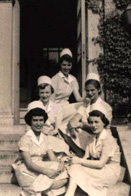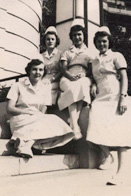"Remember, the first job you get doesn’t have to be exactly what you want to do with your life, or be where you want to end up; consider traveling, additional education, or making a move."
Former Professor Emerita of Nursing, Cape Cod Community College
Professional Career:
 While students approaching graduation tend to feel under pressure if they don’t have their career paths mapped out, Xenia Christiansen ’54 encourages Adelphi students in the School of Nursing to embrace the uncertain future, and the opportunities that a career in nursing can open throughout their lives.
While students approaching graduation tend to feel under pressure if they don’t have their career paths mapped out, Xenia Christiansen ’54 encourages Adelphi students in the School of Nursing to embrace the uncertain future, and the opportunities that a career in nursing can open throughout their lives.
She has this message for young graduates: “There are so many different things you can do with your nursing degree. Remember, the first job you get doesn’t have to be exactly what you want to do with your life, or be where you want to end up; consider traveling, additional education, or making a move,” she says. “You are entering a booming field that will offer you so many opportunities.”
When Ms. Christiansen graduated from Adelphi in 1954, she began her career at Bronx Veterans Administration Hospital; an experience she thoroughly enjoyed. “It was a very pleasant working environment, and the patients were so friendly,” she says.
Although happy with her first job, she knew she was ready for a change. Having lived in the Bronx since she and her family emigrated from Aruba when she was eight years old, New York was all she had ever known. Eager to experience life outside of New York, she decided to move to California, find a job, and see what the West coast was like.
Even though she was moving 3,000 miles from home, she was confident that because she had completed Adelphi’s four-year program, she would face little difficulty finding a nursing job. “I knew no institution would turn down a baccalaureate degree holder,” she says. She got a job at UCLA Medical Center, and was ready to take full advantage of all California had to offer. In this position she was promoted to assistant head nurse. “I often worked the evening shift,” she recalls. “That way I could enjoy the beautiful sunlight and Californian beaches during the day.”
Following a year living and working in the Golden State, she returned home and landed a position as a staff nurse at New York University Hospital, today known as NYU Medical Center. The value of her Adelphi degree was evident as she rose to head nurse, supervisor, and then assistant director of nurses. During this time she also took courses at NYU and pursued her Master of Arts in nursing education at Teachers College, Columbia University, which she received in 1959.
While working at University Hospital, Ms. Christiansen played an integral role in a research study surrounding innovative technology that would affect the future of patient care. “I led a team of nurses in a study testing different electronic monitoring devices that were being manufactured at the time,” she says. After conducting and writing up her findings, she was asked to give a speech based on her research report at the American Nurses’ Association’s National Convention, held in Detroit, Michigan in May 1962. An article based on her report was later published in The American Journal of Nursing, the oldest and largest circulating nursing journal in the world.
In 1962 she and her husband Johan were married in New York, after which her husband’s work brought the newlywed couple to New Bedford. Awaiting her in Massachusetts was a position at St. Luke’s Hospital. “They were pleased to have a nurse with a bachelor’s and master’s degree,” she recalls. “At the time, nurses with master’s degrees were a rarity.”
She was hired as an instructor of nursing at the hospital, which was a step in a different direction for Ms. Christiansen. “I thought I was better suited for a clinical or supervisory position,” she says, “but teaching grew on me.” In 1963, when she and her husband moved to Chatham, Massachusetts, she obtained a teaching position at Cape Cod Hospital. When the hospital’s School of Practical Nursing closed in 1971, she was approached by members of the Cape Cod Community College faculty who invited her to join their Associate in Science nursing degree program.
“Originally I didn’t think I wanted to leave the hospital setting,” she says, “but I found that working at a college offered a nurturing, friendly, collegial atmosphere.” It also afforded her the flexibility to raise her children, John and Peter.
“I spent my first five years at Cape Cod Community College working part time as a clinical nursing instructor. While my husband and I could have used the extra money at that point in our lives, we felt it was important that I be there for the children when they were young,” she says. “Working at a college was an ideal job for raising my children.”
By 1976, with her two sons older (12 and 8 years old), she began working full time as an assistant professor specializing in fundamentals of nursing and pediatrics nursing. Over the course of her nearly 30-year career at Cape Cod Community College, she ascended the academic ranks to associate professor and professor, before being named professor emerita upon her retirement in 1997.
“Nursing has been a wonderful career and rewarding,” says Ms. Christiansen, who resides in the lovely town of Chatham, Cape Cod, Massachusetts with her husband.
When and why did you first want to become a nurse?
 I was initially interested in physical therapy, but my high school guidance counselor advised me to reconsider due to my size. I was good in science and math, but the attitude at the time was that jobs in science were not for women. Women weren’t encouraged to pursue careers in medicine or engineering as they are today. With a strong science background, I decided to pursue nursing. I liked the idea of nursing, and caring for people.
I was initially interested in physical therapy, but my high school guidance counselor advised me to reconsider due to my size. I was good in science and math, but the attitude at the time was that jobs in science were not for women. Women weren’t encouraged to pursue careers in medicine or engineering as they are today. With a strong science background, I decided to pursue nursing. I liked the idea of nursing, and caring for people.
I was the second oldest of seven children, and my parents didn’t have enough money to finance my college tuition. I grew up in the Bronx, and wanted to look at colleges outside the city. As a graduate of the Bronx High School of Science, I was accepted with scholarship support to several colleges. Adelphi offered a four-year nursing program with almost full tuition support. I knew graduating with a baccalaureate degree in nursing would be invaluable. Adelphi was not far from my home. It was just a railroad ride away. In 1950, I enrolled at what was then Adelphi College.
Do you have favorite memories of your time at Adelphi and your residencies?
I really liked Adelphi. It was suburban, and I had never lived anywhere outside of the city.
I remember Ruth Harley, who was Dean of Women. All of Adelphi’s science, anatomy, physiology, and nursing instructors were very good. English Professor James Murray is an instructor who stands out in my mind. I liked to read a lot. His knowledge of English and American Literature was appealing to me.
Because our clinical experiences were shorter during my first and second years at Adelphi, I was able to spend my first two years at home and commute to Adelphi in order to save money. By my junior year, when our clinical experience started to require longer hours, I lived in the nurses’ residence on Adelphi’s campus.
We moved from one hospital to another for our clinical experience. I remember one story from my psychiatric placement. My best friend and fellow nursing student, Mary Schwarz (née Elliot) and I were in a large room together with many of the patients. The attendants left the room, while Mary and I remained there. One of the patients started throwing heavy chairs. Keep in mind that the chairs were designed to be heavy enough to prevent the patients from lifting them, so it was a real fright! As soon as they heard the commotion, the attendants rushed back into the room and restrained the patient. That day I decided I would not become a psychiatric nurse. Mary did too.
There were no more than 30 or 40 students in my nursing class. We grew very close with each other. We had a good time together. We would socialize after a long day of lectures, exams, clinical, and caring for patients. Many people think nursing education is easy, but it’s a very demanding field of study.
What are some changes you have seen in nursing throughout the years?
While working at University Hospital from 1955 to 1969, I was involved in a study that was being conducted on a select group of patients to test new electronic monitoring equipment being developed. We were responsible for assessing how three different models worked, how the patients responded to each, and whether or not the readings were accurate. (We would take the patients’ blood pressure and pulse rate manually, and then compare measurements that had been recorded by the instruments). While these devices were revolutionary at the time, the electronic monitoring of patients is used all the time now. Advances in knowledge and technology over the past 20 years have resulted in many changes in medical and nursing care, affecting the scope of nursing education.
What advice would you give to today’s nursing students?
Remember that you are a nurse. You are not there primarily to serve the hospital, or to be the doctor’s assistant. You are there to care for the patient/client and assist him to meet his needs in health and illness.
Be a patient advocate. Do what is right for your patients; take care of them, speak up for them. This was something that was instilled in me at Adelphi, and I was proud to find myself advocating for my patients early on in my career. My Adelphi instructors taught me to stand up, even if that meant I would anger the doctor or be reported. I will never forget an experience that occurred just two years after I graduated from Adelphi. A patient who was dying was being ignored by the attending physicians and the residents/interns were not visiting him on rounds. I remember the patient asking me, “Will the doctor come see me today?” I was concerned and upset. I went to speak to the chief medical resident and told him that this patient needed to be seen on daily rounds. While the resident assured me that they were doing everything they could for the patient, I insisted that the patient needed to see and feel that he was being cared for. My words must have resonated with him because that afternoon, the resident went to visit the patient, and thereafter included him in daily rounds.
For further information, please contact:
Todd Wilson
Strategic Communications Director
p – 516.237.8634
e – twilson@adelphi.edu